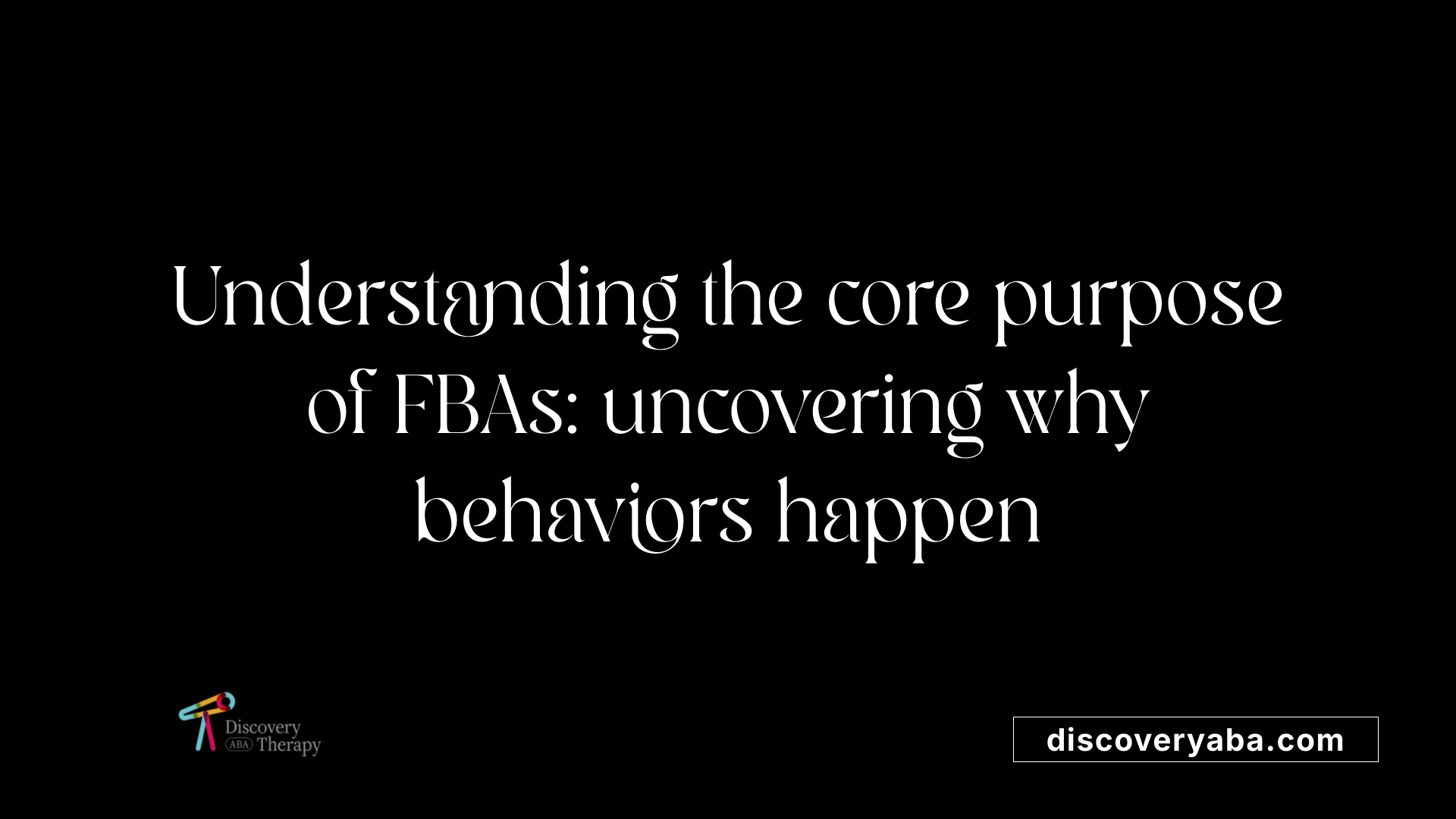The Role of Functional Behavior Assessments in Preventing Problem Behaviors
Understanding the Power of Functional Behavior Assessments in Education

Introduction to FBAs and Their Significance
Functional Behavioral Assessments (FBAs) are essential tools in understanding, managing, and preventing problem behaviors in educational settings. By systematically analyzing the functions of behaviors, educators and support professionals can develop targeted interventions that promote positive behavioral change. This article explores the purpose, methodology, and applications of FBAs, emphasizing their critical role in fostering safer, more inclusive learning environments.
The Fundamental Purpose of FBAs

What is the purpose of a functional behavioral assessment (FBA)?
The main goal of an FBA is to uncover the reasons behind problematic behaviors exhibited by students. It looks into the specific triggers or antecedents that set off the behavior and the consequences that reinforce it. By analyzing environmental factors and contextual variables, practitioners can develop hypotheses about why a student acts in certain ways.
This understanding is crucial because it guides the development of behavioral strategies that target the root causes, not just the symptoms. The ultimate aim is to promote positive change and help the individual function better in their environment.
FBAs are especially valuable for creating personalized support plans — called Behavior Intervention Plans (BIPs) — which help reduce challenging behaviors and teach new, more appropriate skills.
Understanding behavior functions
Behavior functions refer to the underlying reasons why a student might engage in a specific behavior. These typically fall into categories such as seeking social attention, gaining access to preferred activities or objects, avoiding demanding tasks, or satisfying automatic sensory needs.
Knowing the function helps educators and support teams to decode what a student is trying to accomplish through their actions. For instance, if a child lashes out to escape a difficult assignment, an intervention can focus on teaching alternative ways to request breaks.
Research shows that understanding these functions is fundamental; behaviors are seen as purposeful and manageable when their causes are clear. This knowledge enables the design of interventions that are more effective and humane.
Guiding effective interventions
When the purpose of an FBA is understood, it directly informs intervention strategies. Rather than relying on generic discipline or reinforcement methods, educators can implement targeted techniques based on the identified function.
For example, if a student's disruptive behavior serves to gain attention, strategies might include teaching the student more appropriate ways to ask for help or recognition. If the behavior functions as automatic reinforcement, interventions may include providing sensory items or activities.
Overall, FBAs support a proactive, tailored approach to behavior management. They ensure that interventions are not only effective but also aligned with the individual's specific needs, leading to more sustainable behavioral improvements.
The Process and Key Steps in Conducting FBAs

What are the steps involved in conducting a functional behavioral assessment?
Conducting an FBA involves a step-by-step process rooted in understanding the underlying causes of student behaviors. Initially, professionals identify and clearly define the specific behaviors of concern, ensuring they are observable and measurable. This step also includes pinpointing appropriate replacement behaviors that serve the same function.
Next, various data collection methods are employed to gather detailed information about the behavior's context. These methods include direct observations using tools like Antecedent-Behavior-Consequence (ABC) charts, interviews with teachers, parents, and students, and rating scales or questionnaires. These data help in understanding when, where, and why behaviors occur.
Following data collection, the information is meticulously analyzed to detect patterns or triggers related to antecedent conditions, environment, or outcomes that reinforce the behavior. Based on this analysis, a hypothesis about the function of the behavior—such as gaining attention, escaping tasks, or automatic reinforcement—is formulated.
This hypothesis is often tested through systematic functional analysis, where environmental variables are manipulated in controlled ways to confirm the behavior’s purpose. Throughout this process, the team refines their understanding, making adjustments as new data emerge.
Finally, with a clear understanding of the behavior’s function, a Behavior Intervention Plan (BIP) is developed. This plan incorporates strategies specifically targeting the identified function, such as teaching alternative skills, modifying the environment, or changing consequences. The intervention is then implemented and regularly evaluated for effectiveness, with modifications made based on ongoing data.
Who can conduct a functional behavior assessment?
Qualified professionals such as school psychologists, behavior analysts (including Board Certified Behavior Analysts or BCBAs), and trained educators are typically responsible for conducting FBAs. The scope of their roles can depend on the setting and the complexity of the behavior involved.
Effective FBA requires expertise in observing and analyzing behaviors, understanding environmental influences, and developing tailored intervention strategies. Multidisciplinary teams often collaborate, including healthcare providers, social workers, and family members, to ensure the assessment covers all relevant factors.
Proper training is vital to conduct FBAs ethically and effectively. Professionals must adhere to established guidelines and standards, such as those from the National Institute for Health and Care Excellence (NICE) and the Department of Health. Ensuring compliance with legal requirements also involves obtaining parental consent and considering individual student needs.
By following these procedures with properly trained personnel, schools and practitioners can ensure that FBAs lead to meaningful and effective interventions that support positive behavior change.
Legal and Procedural Requirements for FBAs in Schools
When is an FBA required by law?
A Functional Behavior Assessment (FBA) becomes a legal requirement primarily when a student with disabilities shows challenging behaviors that might lead to a change in their educational placement or require specific interventions. Rights frameworks like the Individuals with Disabilities Education Act (IDEA) in the United States mandate that schools conduct FBAs to understand behaviors that impede learning or safety, especially if disciplinary actions involve removals exceeding ten days.
In Minnesota, specific laws such as Minn. R. 9544.0020 specify components of an FBA, including assessments of biological, psychological, and environmental factors. Schools must follow these regulations and involve qualified professionals, such as behavior analysts or school psychologists, to conduct thorough and compliant FBAs.
When behaviors pose safety risks or significantly disrupt the educational process, an FBA guides the development of effective behavioral support strategies. This is not only essential for legal compliance but also ensures that interventions are ethical, personalized, and effective.
What legal frameworks support the use of FBAs?
Federal laws, primarily IDEA, underscore the importance of Functional Behavioral Assessments as a cornerstone in supporting students with disabilities. IDEA requires that schools reliably identify the function of problematic behaviors before designing interventions, thus promoting individualized and humane approaches. This legal backing guarantees that students receive appropriate behavioral assessments and supports tailored to their needs.
In addition to IDEA, other statutes and regulations emphasize procedural safeguards, such as documenting assessments and ensuring parental involvement. These laws protect students’ rights to a free appropriate public education (FAPE) and mandate that behavioral issues are addressed with best practices rooted in research.
Having clear legal requirements helps ensure that schools and providers systematically implement FBAs, thereby improving outcomes for students, reducing unnecessary disciplinary actions, and fostering inclusive learning environments.
| Aspect | Legal Mandate | Supporting Regulation or Law | Purpose |
|---|---|---|---|
| When is an FBA mandated? | Yes, for behaviors challenging placement or safety | IDEA, Minn. R. 9544.0020 | To develop tailored intervention plans |
| Who should conduct it? | Qualified professionals mandated by law | State and federal requirements | To ensure assessments are valid and ethical |
| What does the law require? | Documentation, parental involvement, compliance | IDEA, state regulations | To secure due process and effective interventions |
| Why is it important? | To guarantee appropriate behavioral supports | Federal and state laws | To protect students' rights and promote positive change |
Resources and Tools for Effective FBAs

What resources are available for implementing FBAs effectively?
Implementing Functional Behavioral Assessments (FBAs) effectively requires access to a range of professional resources and tools. Various organizations such as the Association for Behavior Analysis International (ABAI) and the Council for Exceptional Children (CEC) provide comprehensive guides, training modules, and certification programs dedicated to FBA procedures. These resources help professionals deepen their understanding and skill set.
Educational agencies and school districts often facilitate access to workshops, webinars, and ongoing consultative support. These initiatives are designed to keep staff updated on best practices and recent research developments.
Moreover, numerous publications, online platforms, and research articles offer practical materials such as templates, checklists, and case studies. These tools support practitioners in systematically conducting assessments, recording data, and analyzing behavior patterns. Utilizing such resources enhances the precision of FBAs and ensures that interventions are well-grounded in data.
How can educational professionals be trained in FBA procedures?
Training in FBA techniques can be effectively delivered through specialized programs from reputable organizations like ABAI and CEC, which offer certifications, online courses, and workshops tailored for educational staff. Schools and districts might also organize in-service training sessions led by licensed behavior analysts. These sessions provide hands-on experience through case studies, role-playing, and guided data collection exercises.
Ongoing professional development is vital, with supervision from qualified behavior analysts ensuring that educators master all aspects of the assessment process. Such continuous learning helps maintain high standards of practice, promoting ethical, accurate, and effective FBA administration.
Resources and training for FBA implementation in educational settings
| Resource Type | Examples | Purpose | Additional Notes |
|---|---|---|---|
| Certification Programs | ABAI, CEC | Formal credentialing in FBA techniques | Promotes standardized skills |
| Training Workshops | District-based, online webinars | Practical skill development | Focus on real-world applications |
| Templates and Checklists | Operational behavior definitions, ABC data forms | Streamline data collection | Enhance consistency |
| Case Studies | Published research, practitioner reports | Learning from real examples | Supports contextual understanding |
| Professional Support | Behavior analysts, consultants | Supervision and advice | Ensures ethical practice |
Access to these resources streamlines the FBA process, improves accuracy, and facilitates effective behavioral interventions, ultimately supporting positive outcomes for students.
Types of Behaviors Assessed and Their Significance

What are some examples of behaviors assessed through an FBA?
Functional Behavioral Assessments (FBAs) evaluate a wide range of behaviors that can be challenging for students. Common examples include aggression, such as hitting, kicking, or biting, which often serve to gain attention or escape tasks.
Self-injurious behaviors like head-banging, pinching, or biting oneself are also assessed, especially when they pose safety risks. Other behaviors include tantrums, crying, or yelling during classroom activities, which may be efforts to avoid demands or gain control.
Disruptive behaviors such as shouting, throwing objects, or excessive vocalizations often indicate a student’s attempt to communicate frustration or seek sensory input. Specific behaviors like a student removing clothing unexpectedly, self-pinching, or prolonged crying are evaluated to understand their purpose.
In addition, stereotypical actions such as repetitive vocalizations, hand-slapping, or bouncing might serve sensory functions. Behaviors may occur with greater frequency during particular times of day or in specific environments, allowing analysts to identify triggers.
FBAs analyze these behaviors within the context of their functions—whether they are maintained by attention, escape from tasks, sensory stimulation, or access to tangible objects. Understanding the function informs the development of targeted, effective interventions.
Components and Outcomes of a Robust FBA

Behavior description
A fundamental part of an FBA involves clearly describing the specific problem behaviors. This means defining what the behavior looks like in observable and measurable terms, such as frequency, duration, and intensity. Accurate description helps ensure everyone involved understands the behavior and can measure changes over time.
Environmental influences
Understanding what triggers or maintains the behavior is crucial. This involves identifying antecedents—events or conditions that occur before the behavior—and consequences—what happens after the behavior that may reinforce it. These environmental influences can include social interactions, physical settings, or specific tasks that either provoke or suppress the problem behavior.
Hypotheses and analysis
Based on data from observations and interviews, professionals develop hypotheses about the function or purpose of the behavior. These hypotheses explain why the student might be engaging in the behavior, such as seeking attention, avoiding tasks, or fulfilling automatic sensory needs. Analyzing this information helps practitioners understand the underlying cause, guiding targeted intervention plans.
Intervention development
Armed with insights from the FBA, educators and support teams create intervention strategies that address the behavior’s function. These interventions often include teaching replacement skills, modifying environmental factors, and adjusting consequences to reinforce positive behaviors. A well-designed FBA ensures strategies are personalized, thus increasing the likelihood of successful and lasting behavior change.
The Impact of FBAs on Early Intervention and Support Systems
What benefits do FBAs provide in early intervention?
Functional Behavioral Assessments (FBAs) play a crucial role in early intervention by helping educators understand the reasons behind a student's problem behaviors. This understanding allows for the development of targeted strategies before behaviors become severe or ingrained. Early use of FBAs promotes timely support, reducing the likelihood of escalation into more serious issues.
Moreover, FBAs support the implementation of multi-tiered support systems such as Positive Behavioral Interventions and Supports (PBIS) and Response to Intervention (RTI). These frameworks address behavioral and academic challenges through layered interventions tailored to each student's needs. As a result, FBAs assist in establishing positive behavioral norms, decreasing disciplinary actions, and fostering social-emotional growth from the beginning.
In summary, utilizing FBAs early helps create proactive, effective programs that prevent problems, support positive development, and improve overall school climate.
Legal and Ethical Considerations in FBA Practice
What legal and procedural guidelines govern FBAs in schools?
Legal and procedural standards are integral to the responsible implementation of Functional Behavioral Assessments (FBAs) in educational settings. Federal laws, notably the Individuals with Disabilities Education Act (IDEA), require schools to conduct FBAs for students with disabilities, especially when disciplinary actions involve removal from current placements for more than 10 days. These assessments are essential to understanding the behavior's function and formulating effective interventions.
State-specific laws and regulations further specify procedures for conducting FBAs, emphasizing the importance of informed consent, environmental safety, and data accuracy. Schools must ensure assessments are minimally intrusive and conducted by qualified personnel such as behavior analysts or trained school psychologists.
Following these guidelines helps protect student rights, fosters transparency, and aligns interventions with legal obligations. Proper documentation and adherence to protocols ensure assessments are fair, reliable, and ethically sound, ultimately contributing to better support strategies tailored to each student's needs.
Final Thoughts: Maximizing the Impact of FBAs in Education
Functional Behavioral Assessments are invaluable tools in the effort to create safer, more inclusive educational environments. By systematically uncovering the reasons behind challenging behaviors, FBAs enable educators and support staff to develop precise, effective intervention strategies that prevent escalation and promote positive growth. Their alignment with legal standards and ethical practices ensures that interventions are respectful, individualized, and sustainable. Continued investment in professional training, resources, and early application of FBAs promises to enhance support for students with diverse needs, ultimately fostering better academic, social, and emotional outcomes for all learners.
References
- Page 4: Conduct a Functional Behavioral Assessment - IRIS Center
- Functional Assessment of Problem Behavior: Dispelling Myths ...
- [PDF] Functional Behavioral Assessment (FBA) and Behavior Intervention ...
- The Big Four: Functional Assessment Research Informs ...
- [PDF] Functional Behavioral Assessment and Behavioral Intervention Plans
- Functional Behavior Assessment | EBSCO Research Starters
- FBA - Michigan Alliance for Families
- Functional Behavioral Assessment - Kansas Inservice Training System
Find More Articles
Contact us
North Carolina, Tennessee, Nevada, New Jersey, Utah, Virginia
New Hampshire, Maine
Massachusetts, Indiana, Arizona, Georgia
.avif)








































%2520(1).jpeg)































.jpeg)






















